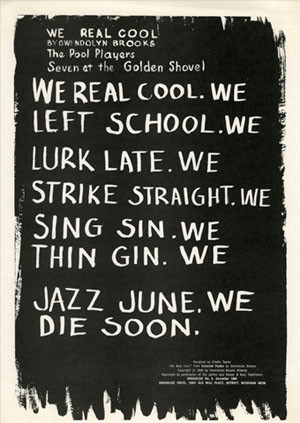The New Broadside Lotus Press

Naomi Long Madgett is 91 years old, but she continues to shape Detroit poetry. Author of 10 books of poetry and a professor emerita of Eastern Michigan University's English Langage and Literature department, Madgett's awards are too many to list: highlights include poet laureate of Detroit in 2001, the Kresge Eminant Artist award in 2012, and a number of honorary doctorates. On March 31, Madgett gave a reading at the Detroit Public Library, drawing from Connected Islands: New and Selected Poems. The poems moved from the narrative to the lyric, from the biographical to the homage. One sequence was a mourning and memorial to a murdered friend. As Madgett writes in another poem, “City Nights,” “There is nothing you can tell me / about the city / I do not know.”
The reading on March 31 included an historic announcement: that Madgett's Lotus Press would be merging with Broadside Press, another foundational Detroit literary institution, forming the new Broadside Lotus Press. Madgett founded Lotus Press in 1972 when she struggled to find a publisher for her fourth book of poems. She soon realized that there was still a need for presses that promoted African-American writers. Lotus has been in operation continuously since it was founded (Sue Levytsky offers a brief history of Lotus Press in the Kresge Foundation's monograph on Madgett, which I draw from here). Madgett told the audience at the Detroit Public Library on March 31 that she recognized the need to pass the press on to other hands, which led to the new merger.
Like Lotus, Broadside Press has been an American institution since it was founded in 1965 by the poet Dudley Randall (who passed away in 2000). According to Gloria House, in a brief retrospective on Randall and Broadside (available here), Randall turned to the single-poem broadside format after a visit to the Soviet Union, another transnational link in Detroit's history of connecting poetic form to radical politics. Broadside's list of authors is impressive: Gwendolyn Brooks, Amiri Baraka (at the time LeRoi Jones), Langston Hughes, Jean Toomer, Melvin Tolson, Nikki Giovanni, and many others. A number of university archives house Broadside material, including the University of Detroit, Mercy, UMass, Amherst, and Central Michigan University. Fortunately, funding was recently awarded by the Knight Foundation to convert every Broadside publication into a digital form for widespread distribution. The future of Broadside Lotus Press will thus include greater access to its past, a history essential for understanding poetry in Detroit.
Detroit poetries: Field notes